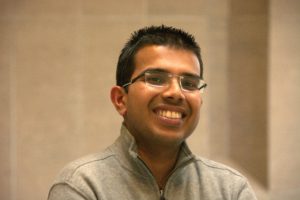CRS Seminar: A definitional issue? Postcolonial paradox of the refugee/migrant binary in the subcontinent
Guest speaker: Jay Ramasubramanyam, Assistant Professor (Teaching) in the Law & Society Program at York University
Abstract:
In August 2017, the Government of India directed authorities to identify ‘illegal immigrants’, including Rohingya refugees, and commence deportation procedures. A writ petition was filed in the Supreme Court of India to prevent this, which is pending.[1] This policy decision has emerged in light of India’s anti-Muslim sentiments and attempts to redefine citizenship along religious lines. This paper argues that conceptual issues associated with defining refugees and migrants in the subcontinent are manifestations of the constraints associated with the 1951 Convention Relating to the Status of Refugees.
The paper draws on the concerns raised by both India and Pakistan on the Convention in its early days. After the end to formal colonialism in the subcontinent, the newly independent states requested that the Convention address displacement resulting from the 1947 Partition of India.[2] However, objections raised by the drafters[3] led to regional disillusionment with the Convention. Drawing on this contentious relationship of the subcontinent with the Convention the paper argues that a strategic ambiguity has blurred the categories of ‘refugees’ and ‘migrants’ in the region and has manifested in arbitrary norms of ‘protection’ and policies of exclusion. The paper further argues that the dominant refugee/migrant labels fail to adequately account for the complexity of subcontinental histories; drivers of migration in the region are subjectively distinct from the European experience.
The paper articulates the need to adequately accommodate alternate locations of practice. It also elucidates the disconnect that currently exists between Eurocentric conceptual categories and the lived experiences of those on the move in the region, thereby challenging the dichotomy’s fragile foundations.
[1] Mohammad Salimullah v Union of India, Writ Petition (C) No 79 of 2017, 30 August 2017 (Supreme Court of India).
[2] Third Committee, Social, Humanitarian and Cultural Questions, Summary Record of the Seventy Seventh Meeting held at Lake Success, New York (6 November 1947), UN doc AC.3/SR.77, 189 (statement of Mrs Hussain).
[3] Third Committee, Social, Humanitarian and Cultural Questions, Summary Record of the Eightieth Meeting held at Lake Success, New York (7 November 1947) UN doc AC.3/SR.80, 211 (statement of Mr. Sen).
Biography:
 |
Jay Ramasubramanyam is an Assistant Professor (Teaching) in the Law & Society Program at York University, Toronto. Professor Ramasubramanyam obtained his B.A. in Criminology from Victoria University of Wellington, New Zealand (2009). He received a Postgraduate Diploma and LL.M. in International Human Rights from Birmingham City University, United Kingdom (2011) and his Ph.D. from the Department of Law and Legal Studies and the Institute of Political Economy, at Carleton University (2021). |
He is a global south migration researcher. His research expertise includes forced migration, international refugee law, statelessness, third world approaches to international law, human rights, race and racialization, postcolonial theory, and South Asian studies. His research explores the asymmetries of power, knowledge production and the ostensible legitimacy of norms in the field of refugee studies and refugee law.
He recently published an article in the Asian Yearbook of International Law on refugee law in the Indian subcontinent, and two book chapters in The Oxford Handbook of International Refugee Law. He formerly taught in Carleton University in the areas of social justice and human rights, refugee rights, international law, and race and racialization. In recognition of his teaching excellence, he won the Contract Instructor Teaching Award.
He was formerly a visiting scholar in the American Bar Association in Washington D.C., and a visiting researcher at the Andrew and Renata Kaldor Centre for International Refugee Law in Sydney, Australia.
Prior to his entry into academia, he was employed by the Office of the United Nations High Commissioner for Refugees (UNHCR) as a Refugee Status Determination Associate and in the International Committee of the Red Cross (ICRC) as a Protection Field Officer.
******
Register in advance for this meeting:
https://yorku.zoom.us/meeting/register/tJ0lcOGrrjMvGtGtMuM3hdgVokkngcIy8Ccw
After registering, you will receive a confirmation email containing information about joining the meeting.

